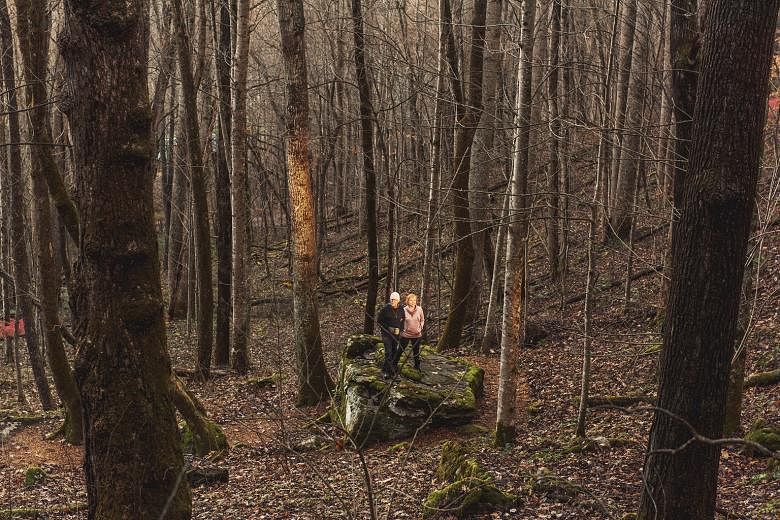Since the beginning of the pandemic, Paul Fredette and Karen Karper Fredette have made some changes to their lives: Karen Fredette stopped attending her local exercise class and the couple whittled their interactions with their neighbours down to waves.
But in many ways, seclusion comes naturally to them. From a house they call Still Wood, nestled in the slope of a mountain surrounded by wild woodlands, the Fredettes live their lives "oriented towards solitude", which is their preferred way of saying that they are hermits: devoted to simplicity, silence and prayer. The nearest town, Hot Springs, North Carolina, is 30km away and has a population of just under 600.
Paul Fredette, 71, is a former Catholic priest, while Karen Fredette, 78, spent 30 years in a monastery after high school before leaving to live as a hermit in a cabin in West Virginia.
Since 1996, the couple have overseen a social network for hermits and the hermit-curious called Raven's Bread Ministries. They provide spiritual counselling to seekers of solitude, write books on the topic, run a website and deliver a quarterly newsletter, Raven's Bread, which includes contributions from the greater hermit community.
The original idea for Raven's Bread Ministries was to validate hermits' attraction to solitude. But this summer, the Fredettes felt called to minister to a different demographic: those struggling with the isolation of the coronavirus pandemic. After noticing their average daily website hits went to up to 2,000 in August, from around 800 pre-pandemic, the Fredettes began creating YouTube videos. Listening to them feels a bit like getting a very quiet pep talk from your grandparents or watching an unusually spiritual autonomous sensory meridian response video.
Today, there are hermits who have been officially professed by their respective religious institutions - in Catholicism they are called "canonical hermits" - and rogue hermits who answer to no spiritual authority. There are hermits who live in caves, like the Himalayan Hermit, who spends his summers in a mountain crevice 10,000 ft above Gangotri, India. But many more hide in plain sight, in suburbs and cities.
Hermits have never been quite as isolated as many assume. They have often attracted devotees and have always had to earn their own living, which means allowing some contact with the outside world.
Contemporary hermits might take jobs that require little human interaction, like cleaning houses. They try to fill what extra time they have with spiritual practice, rather than social interaction, in person or online, and make choices that support that end. They'll meditate on their commute rather than read the news or answer their phone only during designated hours.
They can live anywhere but tend to reside in modest dwellings and avoid moving around unnecessarily. Nevertheless, a hermit should also not be confused with a recluse. The difference, Karen Fredette said, is that hermits do not exit society because of misanthropy.
Hermits themselves are torn on the issue of whether anyone can embrace solitude.
"Solitude is not like protein," said Ms Heidi Haverkamp, a Raven's Bread subscriber and author of Holy Solitude: Lenten Reflections With Saints, Hermits, Prophets, And Rebels, who describes herself as a part-time solitary.
"Some people find what I get from solitude in music or in exercise - just different ways that they access the transcendent."
"Solitude is a means," said John Backman, a writer and "quasihermit" who affiliates with both Zen Buddhism and Christianity. "It is a means to draw closer to, immerse oneself in, that or who which is larger than we are, to immerse ourselves in Spirit, as it were."
But the Fredettes and other hermits believe that anyone could benefit from fundamentals such as being rooted in place, practising austerity and committing to a daily schedule that prioritises prayer or meditation - to help them make sense of their isolation in their lives, regardless of personality type, religiosity or life circumstances.
The most potent grounding force of all, many hermits said, is nature.
Today, some hermits just walk around in a patch of grass, something Sister Rachel Denton, a canonical hermit in Sheffield, England, called "prayer walking". She also picks up litter in the public park across the street from her home, a community service she calls her "penance".
She said: "Your body doing the walking, doing the pacing; it's like a mantra."
NYTIMES

